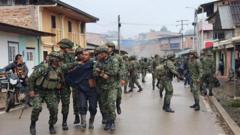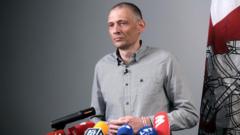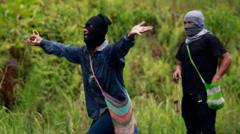**Activist fears grow as mass detentions occur, stifling the voice of dissent in an increasingly authoritarian regime.**
**Crackdown on Journalists in Turkey Amid Protests Raises Alarm for Democracy**

**Crackdown on Journalists in Turkey Amid Protests Raises Alarm for Democracy**
**Journalist arrests highlight increasing repression in Turkey following protests against the government.**
On the morning of March 23, Turkish photojournalist Yasin Akgul found his home invaded by police, arresting him while his children were still asleep. Just hours earlier, he had returned from covering significant anti-government protests in Istanbul. The police presented an arrest order without any explanation, leaving Akgul bewildered and frightened – a feeling he had never experienced during his decade-long career documenting conflicts in Syria and Iraq, and even during violent protests in Turkey.
Akgul was among seven reporters detained in coordinated police actions aimed at silencing those covering the unrest ignited by the controversial arrest of Ekrem Imamoglu, the opposition mayor of Istanbul. His arrest, accused of corruption charges he denies, has been deemed politically motivated, aiming to dismantle his presidential aspirations against President Recep Tayyip Erdogan's long-standing rule.
Despite the government's public ban on protests, large demonstrations erupted as citizens voiced their outrage against perceived injustice and political oppression. Akgul’s arrest is seen as an escalation in a broader campaign against journalists; he now faces accusations of participating in illegal demonstrations. His actions during the protests produced compelling photographs that circulated globally, depicting intense clashes between citizens and law enforcement.
"It sends a clear message to all journalists: Don't document the truth. Stay silent," Akgul conveyed, reflecting on how the state seeks to instill fear among media professionals. His fears were echoed by many in the journalistic community, leading to a sudden decline in coverage by freelancers unwilling to risk arrest.
As worries grow about the erosion of Turkish democracy, the effect of such detentions extends beyond journalists. Legal representatives for Imamoglu and others are now also at risk of persecution. Ece Guner, a lawyer and advisor to Imamoglu, highlighted the anxiety spreading among her peers as they fight for justice in a system increasingly perceived as politically controlled.
Recent data reveals that approximately 2,000 individuals have been apprehended since protests began on March 19, including students aligned with the younger generation raised under Erdogan’s regime. The crackdown serves as a stark warning to those who dare to oppose the government’s narrative.
Human rights advocates stress the need for an open dialogue, emphasizing the government’s attempts to quash free expression. As public demonstrations continue—despite heightened police presence—ordinary citizens express concern for their personal safety yet still feel an obligation to advocate for democracy.
Prominent rallies have attracted significant crowds despite the risks, with demonstrators voicing their intentions to persist in their fight for justice and reforms. Opposition leaders are now pushing for an early presidential election, hoping to challenge the government's authority and hold accountable those responsible for the growing authoritarianism.
Despite the uncertainty surrounding his charges, Akgul remains determined to continue documenting the changing landscape of Turkey, stating, "Someone needs to tell the story, and I believe I am one of those people."





















